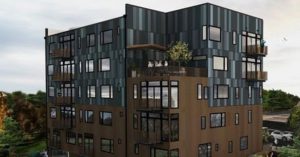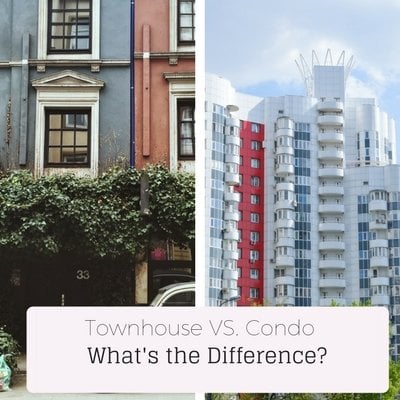Condos, formally known as condominiums, and townhouses are easy to confuse. Condos might conjure up slope-side images and townhouses make you think of block-lining brick buildings. While those images might be on point, there’s a little more to differentiating between condominiums and townhouses. Let’s take a look.

Town-home in Chapel Hill
By definition, town-homes are “architecturally similar conjoined units owned by individual tenants”. Let’s translate into regular terms. First of all, town-homes are defined by how they look, not ownership. Town-homes are usually part of a community, with a similar exterior design. As single family homes, you can think of town-homes like a condensed version of a regular single-family home. With a town-home, you actually own the land that the unit sits on. With a condo, you only own what is within the walls of the unit and an interest in the common space.

Condominiums in Durham
Condos, on the other hand, are defined by ownership. These units are owned, but if they’re rented out they become apartments. The waters get murky here, because town-homes can technically be condos too.
Overall, the biggest difference between condominiums and town-homes is in their ownership. There are many other differences, though it does boil down to ownership. Let’s look at the smaller details, because they can help you determine what is right for you.
Ownership
Condo owners own only the interior of the unit. They’re not responsible for the land the condo is on. If you’re not crazy about lawn care, a condo might be a great choice for you.
Town-home owners actually own both the interior and exterior of their unit. The exterior includes the lawn, the driveway and pavement, as well as the roof. Just like with condos, you’re not responsible for communal areas or the upkeep of amenities.
Design
Condos come in all kinds of shapes and sizes. Often, we think of condos in high-rises but they can be a part of cottages, a cul-de-sac, apartments, town-homes, or even lofts.
Town-homes, on the other hand, are characterized by their architecture. They are generally multi-story, with bedrooms on one level and living space on another. People living in town-homes usually share at least one wall (between units).
Community and Communal Areas
Condos are usually part of a community, which means owners share the club house, pool, or other amenities provided by the condominium community. Garage space, gyms, and other amenities are often shared too.
Town-home communities often provide pool access, clubhouse access, or other amenities to be shared. However, some town-home communities are a little more private. There are also some town-home communities were there aren’t any communal areas to be shared.
Maintenance
Condo owners don’t have the responsibility to take care of the lawn or yard surrounding their unit or building. Typically, their HOA fees pay for maintenance, which means the maintenance fees they do pay could be greater than town-home HOA fees as more services are provided to condominiums.
Town-home owners or tenants occasionally have the responsibility to take care of the yard or land surrounding their unit. In some cases, HOA dues actually pay for the maintenance and or landscaping of the unit. On the note of HOA fees, if the town-home is owned, then the owner will usually have to pay for HOA dues.
Insurance
Condo owners are fortunate in that their insurance fees are typically lower than that of a house owner, or a town-home owner. Why? Condo owners only have to insure the interior of their unit.
Town-home owners, on the other hand, face a higher insurance fee. Most owners of town-homes have to insure both outside the unit, and inside the unit.
Privacy
Condos do provide a privacy, however you’re likely to have neighbors on all sides. This depends on style of the condo, though, because they could range from apartment style condominiums to private, cottage style.
Town-homes offer a good deal of privacy, because you’re only sharing one or two walls with a neighbor. They’re not subject to having people below or above them. Having multiple stories, town-homes are larger than condos for the most part, offering more space.
Mortgages
It is very important to know that getting a loan on some condos may be difficult. You need to ask your Realtor if they know or will find out the Investor Concentration Ratio (the number of units rented compared to all of the units in the complex). Many lenders will not do loans for condos if the investor concentration ratio is above a certain number, e.g., 70%. Also, if there is a budgetary or legal problem with the HOA, this could also limit a buyer’s ability to get a loan on the property.
Townhouses are like single family homes and typically do not have these types of mortgage issues.
Real Estate Experts
 If you’re having trouble deciding what might be right for you, we’re here to help. Choosing between a town-home or condo doesn’t have to be stressful! At Real Estate Experts, we are fierce representative for our clients and known as expert buyer agents. Contact us and see how we can help you find just the home you are looking for.
If you’re having trouble deciding what might be right for you, we’re here to help. Choosing between a town-home or condo doesn’t have to be stressful! At Real Estate Experts, we are fierce representative for our clients and known as expert buyer agents. Contact us and see how we can help you find just the home you are looking for.

